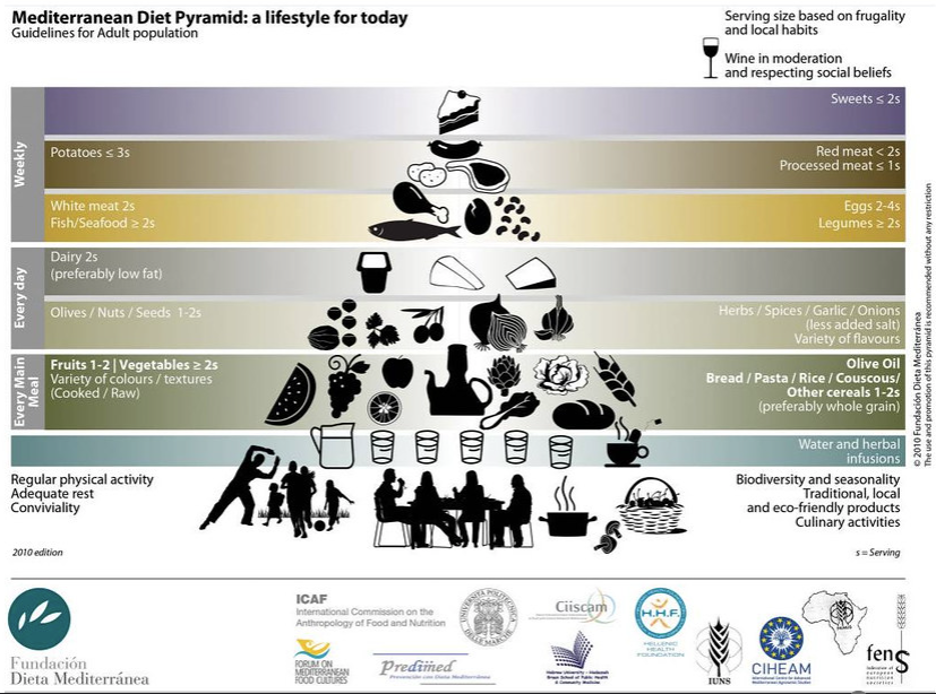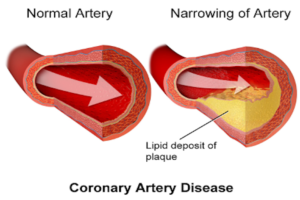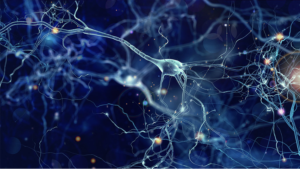
Source: Mediterranean Diet Pyramid (Flikr Public Domain, Zaid Alasad)
The rate of depression among teens in the United States (U.S.) is increasing annually. In fact, 13% of teens in 2017 reported that they experienced at least one episode of depression that year, up from the 8% reported in 20071. Depression is a medical illness that negatively affects how you feel, think, and act2. Teens might feel persistently sad, be uncommunicative, purposely isolated, angry, irritated, or overly sensitive to criticism3. The most common treatment plans for teens with depression are cognitive behavioral therapy and antidepressants4. However, one study by Zielinska and colleagues shows that using a Mediterranean diet (MD) to prevent and treat early-stage depression in teens could be a viable option5.
A high consumption of plant-based foods, lean protein, and healthy fats characterizes the MD4. In contrast with the MD, the Western diet (WD) is loaded with processed food4. This diet is prevalent in many developed countries5. High intakes of sugary and fatty foods, coupled with a low consumption of fruits and vegetables, links the WD to an increased risk of depression in teens5. Research has shown that adolescents who adopt a WD exhibit eating patterns that are associated with depressive symptoms5. This includes an increased desire for sweets, a lack of healthy foods, and nutritional deficiencies. These patterns mirror the symptoms of depression and can aggravate the condition5.
Protein, omega-3 fatty acids, vitamins (A, D, B6, B12), minerals (zinc, iodine, magnesium, and copper), and antioxidants are important nutrients that the MD caters to6. These nutrients are vital for brain health and emotional well-being5.
Omega-3 fatty acids found in fish, nuts, and olive oil are staples of the MD. Clinical trials have demonstrated their potential in relieving and preventing depression because of their ability to reduce inflammation in the nervous system5. Furthermore, vegetables and fruits provide antioxidants and vitamins A, C, and E, which are crucial in reducing oxidative stress, a factor associated with depression5. Low levels of these nutrients have been linked to depressive disorders5.
The MD is a promising candidate for preventing and treating adolescent depression, according to this early research5. Future studies could provide valuable information on factors like magnesium, iodine, and selenium intake. Where it is clear that adolescents in the US are primed for an unhealthy diet because of WD, changes should be made to introduce adolescents to the Mediterranean diet, potentially decreasing the prevalence of adolescent depression5.
References
- Geiger, A.W., & Davis, L. (2019). A growing number of american teenagers-particularly girls-are facing depression. Pew Research Center. https://www.pewresearch.org/short-reads/ 2019/07/12/ a-growing-number-of-american-teenagers-particularly-girls-are-facing-depression/.
- Torress, Felix. (2020). What is depression. American Psychiatric Association. https://www.psychiatry.org/patients-families/depression/what-is-depression.
- Empfield, M., & Bakalar, N. (2001). Understanding teenage depression: A guide to diagnosis, treatment, and management. Macmillan.
- Cognitive behavioral therapy. (2019). Mayo Clinic. https://www.mayoclinic.org/tests-procedures/cognitive-behavioral-therapy/about/pac-20384610#.
- Zielińska, M., Łuszczki, E., Michońska, I., & Dereń, K. (2022). The Mediterranean Diet and the Western Diet in adolescent depression-current reports. Nutrients, 14(20), 4390. https://doi.org/10.3390/nu14204390
- Chopra, C., Mandalika, S., & Kinger, N. (2021). Does diet play a role in the prevention and management of depression among adolescents? A narrative review. Nutrition and health, 27(2), 243–263. https://doi.org/10.1177/0260106020980532
Related Posts
A Field in Focus: Loneliness and Well-Being Research
Figure: An image of a woman wearing a mask, isolated...
Read MoreGender Differences in Health and Medicine and the Importance of Gender-Specific Medicine in Healthcare Policy
This article was originally submitted to the Modern MD competition...
Read MoreDancing Neurons & Their Exciting Impacts
Figure 1: A network of neurons in the brain Source: Elizabeth...
Read MoreHow Many Humans Does it Take to Host a Planet?
Figure 1: This is an artist’s rendering of a potential...
Read MoreThe Geography of Disease: a Bayesian Approach to Epidemiology
Figure 1: A map showing relative rates of pancreatic cancer...
Read MoreProject Empathy: Addressing Substance Abuse in Low-Income Adolescents Across Baltimore
This publication is in proud partnership with Project UNITY’s Catalyst Academy 2024...
Read MoreNoel Chazhur






